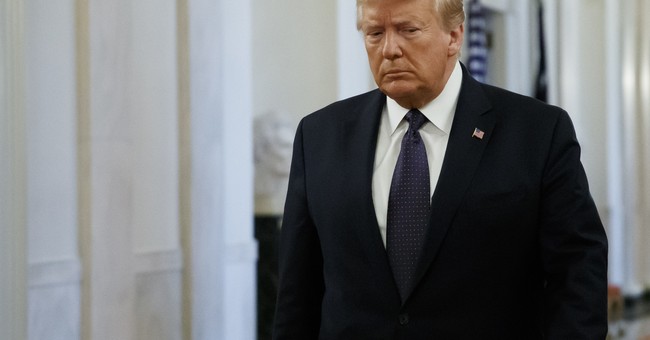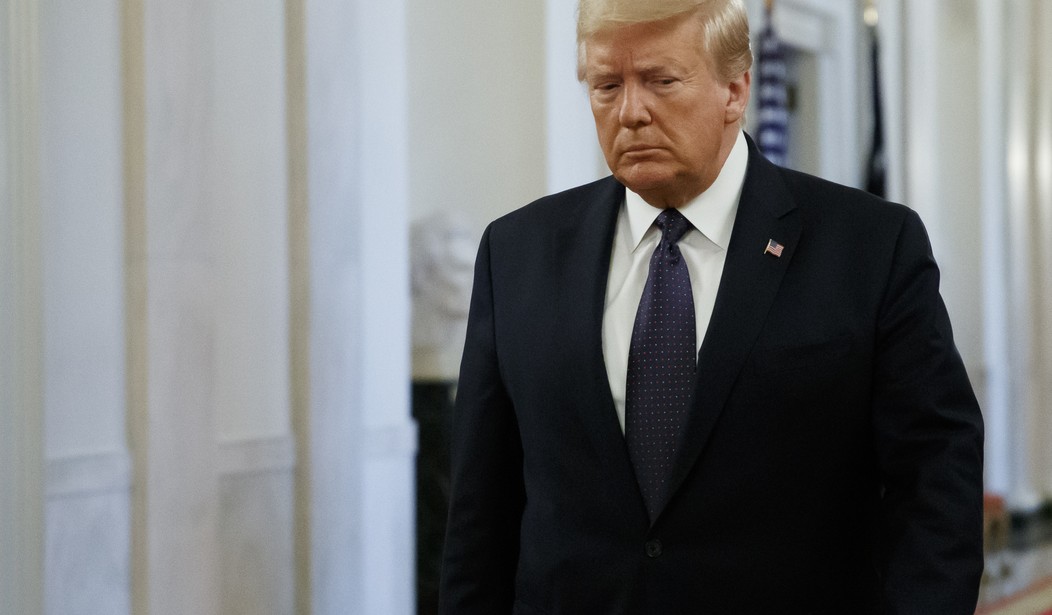
On Wednesday, President Donald Trump spoke in the East Room of the White House about PREVENTS (President’s Roadmap to Empower Veterans and End the National Tragedy of Suicide), a new White House task force aimed at helping veterans – and all Americans – better cope with depression and suicidal ideation.
Pres. Trump said, in part:
My administration is marshaling every resource to stop the crisis of veteran suicide and protect our nation’s most treasured heroes. They’ve been through so much, and it’s such a deep-seated problem….
And I especially want to thank, frankly, wonderful Karen Pence, who is so committed to the veterans and this particular problem….
But there’s more work to do. Ending the tragedy of veteran suicide demands bold action at every level of society. Twenty veterans and service members take their own lives every single day. The loss of our heroes breaks our hearts and pains our souls….
To lead this effort, Mrs. Pence and a team of ambassadors….will mobilize every sector of American society to encourage heroes in need, empower them with the best prevention practices, and help every veteran thrive in their lives after service.
After Pres. Trump’s comments, he invited Marine veteran, Coast Guardsman Chad Hiser, to speak courageously about his own journey with mental illness.
In the past, our heroes were too often overlooked by our leaders, who sent them to fight in foreign lands without taking care of them once they returned home.
Under President @realDonaldTrump, our veterans have been championed since day one.
1600 Daily: https://t.co/A68ueVC88u pic.twitter.com/Nl74igzeeN
— The White House (@WhiteHouse) June 18, 2020
Mr. Hiser said, in part:
The Bible says in Jeremiah 29:11, “‘For I know the plans I have for you,’ declares the Lord. ‘Plans to prosper you and not harm you, plans to give you a hope and a future.’” God never wastes a hurt. These are the words I was told long ago by a mentor and friend, but never really understood their impact until I began the healing process from my trauma that I experienced in combat as the United States Marine.
On March 23, 2003, in one horrific day, 18 Marines were killed that were part of Task Force Tarawa during the invasion of Iraq, at the Battle of an-Nasiriyah. Three days later, there was a friendly fire incident, which rounds were mistakenly fired, resulting in the injury of Marines.
After being honorably discharged at the end of my enlistment, I returned home feeling guilty for surviving, shame for feeling like I hadn’t done enough. The war was still in my mind. I was detached physically, emotionally, and spiritually. I was angry and isolated from the world, including my family.
He continued:
Just one year after leaving the Marines, I decided to return to military service, this time with the United States Coast Guard, seeking a last-ditch effort to cope with the pain and regain my purpose in life. Unfortunately, my condition only worsened.
In 2005, I attempted suicide. I was transported to a medical hospital, diagnosed with post-traumatic stress disorder, and shortly after, I was medically retired.
During this time, my wife was praying. She was asking God to help heal me from this combat trauma. I felt there was no one I could turn to, that my life just wasn’t worth living. As a tough Marine, I was hesitant to seek the help I truly needed to recover.
In 2009, by God’s grace and mercy, I was saved by Jesus Christ after carrying these burdens that I had carried for so long. The newfound hope I had was my foundation now.
In Mr. Hiser’s case, he got assistance through the Veterans Administration (VA), and the agency shares a resource on its homepage, which describes how the task force came about: as a way to help all Americans “deal with the stress and anxiety caused by the pandemic.”
But as a senior administration official told reporters in a call before the President’s comments Wednesday, not every veteran can get help through the VA. So, one prong of the task force’s campaign is to reach those people through community outreach. UPI reported that White House officials said “changing the culture about mental health issues” is part of that effort.
Now, a personal video has come out to further that message — from Vice President Mike Pence’s wife, Second Lady Karen Pence.
In the nearly a minute-and-a-half video, which Mrs. Pence shared on her Twitter account Thursday, she shares what every American can do to help prevent suicides. The number one action? Talk about it.
You can watch the full video below:
Preventing suicide among our #Veterans and our nation is the highest priority. If you or a loved one needs help, please find available resources here: https://t.co/bOdvpJaZkm pic.twitter.com/drw82pRFIf
— Second Lady Karen Pence (@SecondLady) June 18, 2020













Join the conversation as a VIP Member